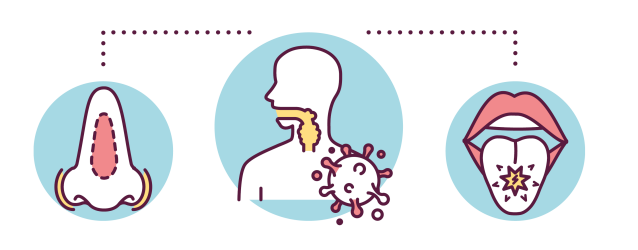Importance of multidisciplinary care for head and neck cancers
News (19/09/2023)
The importance of multidisciplinary care for head and neck cancers
Risk factors and warning signs for “head and neck” cancers
“Head and neck” cancers cover all the tumours that develop in the upper aero-digestive tract or ENT: tongue, palate, nose, sinus, throat, larynx, pharynx, etc. Three risk factors have been clearly identified and they are all avoidable: tobacco, alcohol and the sexually transmissible papillomavirus (HPV) that is very widespread and that can be responsible for several cancers, in particular of the throat. HPV vaccination is therefore a major factor in combating these cancers and should be available to girls and boys before puberty. The earlier the cancer is detected and the earlier it is treated the greater the chances of a cure. So, if you have had any of the following symptoms for more than three weeks, do not ignore it but consult your doctor who will direct you to a specialist:
- Throat pain, mouth ulcer or red or white patch
- Hoarse voice
- Neck tumour
- Pain or difficulty when swallowing
- Unilateral nasal obstruction or blood on your handkerchief when you blow your nose

Treatment options
Cancers of the upper aero-digestive tract affect vital functions: breathing, speaking or even eating. Care for pathologies of this kind aims to determine the most effective treatment that is also most able to respect these essential functions. The available treatment methods are surgery, radiotherapy, chemotherapy, immunotherapy and targeted therapies (monoclonal antibodies). The case of each patient is discussed by a multidisciplinary team so as to offer optimal and personalised treatment.
The importance of paramedical support
Parallel to the treatment, it is essential for the patient to receive paramedical support such as help in stopping smoking, psychological counselling, dietary supervision, speech therapy or physiotherapy. These various aids are designed to ensure the patient comes to treatment in the very best condition and is monitored throughout the treatment pathway. As the patient will encounter a large number of participants in the course of his or her care, it is important to have a single interlocutor: the cancer care coordinator nurse or “ICSO”.
The patient partners as key link in the care
Despite the constant presence of an ICSO, patients can still sometimes experience difficulties in articulating the specifics of their situation. These difficulties are a source of discomfort and great stress. People with cancer rarely express their emotions in the presence of their doctor, either because it makes them uncomfortable or because they fear being stigmatised (Fitch and McAndrew, 2011). The patient partners can be a key link in the treatment chain. They are a reassuring resource as they are people who have travelled the same route, the same care pathway. This means the patient can talk with somebody who understands their questions and concerns. Doctors are never present at their meetings so as to ensure a free exchange that is outside a purely medical context. It is, for example, the occasion to discuss the specifics of surgery or any other treatment and to look ahead to life after cancer.